Outcome prediction in dogs admitted through the emergency room: Accuracy of staff prediction and comparison with an illness severity stratification system for hospitalized dogs
Abstract
Objective
To determine whether emergency staff and students can predict patient outcome within 24 hours of admission, comparing the accuracy of clinician prognostication with outcome prediction by Acute Patient Physiologic and Laboratory Evaluation (APPLE)fast scoring and identifying whether experience or mood would be associated with accuracy.
Design
Prospective observational study between April 2020 and March 2021.
Setting
University teaching hospital.
Animals
One hundred and sixty-one dogs admitted through an Emergency Service were assessed. Where data were available, an APPLEfast score was calculated per patient. An APPLEfast score of >25 was deemed a predictor for mortality.
Interventions
None.
Measurements and Main Results
Emergency staff and students were asked to complete surveys about dogs admitted to the emergency room. All clinicopathological data were available for review, and the animals were available for examination. Data collected included opinions on whether the patient would be discharged from hospital, a mood score, position, and experience in Emergency and Critical Care. One-hundred and twenty-five dogs (77.6%) were discharged; 36 dogs (22.4%) died or were euthanized. Two hundred and sixty-six responses were obtained; 202 responses (75.9%) predicted the correct outcome. Students, interns, residents, faculty, and nurses predicted the correct outcome in 81.4%, 58.3%, 83.3%, 82.1%, and 65.5% of cases, respectively. Of 64 incorrect predictions, 43 (67.2%) predicted death in hospital. APPLEfast scores were obtained in 121 cases, predicting the correct outcome in 83 cases (68.6%). Of 38 cases in which APPLEfast was incorrect, 27 (71.1%) were dogs surviving to discharge. Mean APPLEfast score was 22.9 (± 6.2). There was no difference in outcome prediction accuracy between staff and APPLEfast scores (P = 0.13). Neither experience nor mood score was associated with outcome prediction ability (P = 0.55 and P = 0.74, respectively).
Conclusions
Outcome prediction accuracy by staff is not significantly different to APPLEfast scoring where a cutoff of >25 is used to predict mortality. When predictions were incorrect, they often predicted nonsurvival.

 求助内容:
求助内容: 应助结果提醒方式:
应助结果提醒方式:


